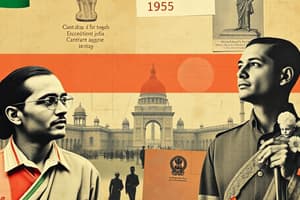Podcast
Questions and Answers
Which of the following is a mode of acquiring Indian citizenship by descent?
Which of the following is a mode of acquiring Indian citizenship by descent?
- Being born outside India before December 10, 1992 if the father is a citizen. (correct)
- Being born in India after July 1, 1987.
- Obtaining a certificate of naturalisation.
- Registering with the Central Government as a citizen.
What does the Constitution of India empower the Parliament to do regarding citizenship?
What does the Constitution of India empower the Parliament to do regarding citizenship?
- Determine the legal age for citizenship.
- Specify the electoral process for citizens.
- Define the rights of citizens only.
- Regulate the process of citizenship acquisition and loss. (correct)
What is the significance of the Citizenship Act (1955) in the context of Indian citizenship?
What is the significance of the Citizenship Act (1955) in the context of Indian citizenship?
- It abolishes previous citizenship laws.
- It outlines the process for acquisition and loss of citizenship. (correct)
- It names the original citizens of India at its commencement.
- It establishes rights of citizens acquired post-1950.
Which mode of citizenship acquisition involves the registration of applicants by the Central Government?
Which mode of citizenship acquisition involves the registration of applicants by the Central Government?
What happens to an Indian citizen's citizenship upon voluntarily acquiring another country's citizenship?
What happens to an Indian citizen's citizenship upon voluntarily acquiring another country's citizenship?
What does 'renunciation of citizenship' entail?
What does 'renunciation of citizenship' entail?
Which of the following methods leads to compulsory termination of Indian citizenship?
Which of the following methods leads to compulsory termination of Indian citizenship?
Which of the following amendments is NOT related to the Citizenship Act (1955)?
Which of the following amendments is NOT related to the Citizenship Act (1955)?
What does the Criminal Procedure (Identification) Act, 2022 authorize the police to do?
What does the Criminal Procedure (Identification) Act, 2022 authorize the police to do?
Which Article of the Indian Constitution relates to the right to free and compulsory education for children?
Which Article of the Indian Constitution relates to the right to free and compulsory education for children?
What is the main difference between punitive and preventive detention as outlined in Article 22?
What is the main difference between punitive and preventive detention as outlined in Article 22?
What does Article 23 of the Indian Constitution prohibit?
What does Article 23 of the Indian Constitution prohibit?
In the context of constitutional rights, what does the K.Puttaswamy judgement affirm?
In the context of constitutional rights, what does the K.Puttaswamy judgement affirm?
What type of laws does the second part of Article 22 specifically address?
What type of laws does the second part of Article 22 specifically address?
Which act was replaced by the Criminal Procedure (Identification) Act, 2022?
Which act was replaced by the Criminal Procedure (Identification) Act, 2022?
What does the Immoral Traffic (Prevention) Act, 1956 primarily address?
What does the Immoral Traffic (Prevention) Act, 1956 primarily address?
What action is prohibited for citizens of India regarding titles from foreign states?
What action is prohibited for citizens of India regarding titles from foreign states?
Which of the following is NOT guaranteed by Article 19?
Which of the following is NOT guaranteed by Article 19?
What is true regarding the hereditary titles conferred by colonial states?
What is true regarding the hereditary titles conferred by colonial states?
Which of the following statements about the National Awards is correct?
Which of the following statements about the National Awards is correct?
What provision does Article 20 include regarding ex-post-facto laws?
What provision does Article 20 include regarding ex-post-facto laws?
Which of the following rights is protected ONLY against state action according to Article 19?
Which of the following rights is protected ONLY against state action according to Article 19?
Which of the following is not a restriction for freedom of speech and expression?
Which of the following is not a restriction for freedom of speech and expression?
What is the primary focus of the provisions in Article 20 regarding punishment?
What is the primary focus of the provisions in Article 20 regarding punishment?
Who is considered the first citizen of India?
Who is considered the first citizen of India?
Which members are not involved in the election of the President of India?
Which members are not involved in the election of the President of India?
What is the principle of election used for the President of India?
What is the principle of election used for the President of India?
How long is the term of office for the President of India?
How long is the term of office for the President of India?
What system of voting is used in the election of the Indian President?
What system of voting is used in the election of the Indian President?
What happens to the acts done by the President if the election is declared null and void?
What happens to the acts done by the President if the election is declared null and void?
Who is eligible for re-election as President of India?
Who is eligible for re-election as President of India?
Which body resolves disputes related to the President’s election?
Which body resolves disputes related to the President’s election?
What is the primary aim of the Directive Principles of State Policy?
What is the primary aim of the Directive Principles of State Policy?
Which amendment made elementary education a fundamental right in India?
Which amendment made elementary education a fundamental right in India?
How many Fundamental Duties are currently enumerated in the Constitution of India?
How many Fundamental Duties are currently enumerated in the Constitution of India?
What distinguishes Fundamental Rights from Directive Principles of State Policy?
What distinguishes Fundamental Rights from Directive Principles of State Policy?
Which article requires the state to ensure early childhood care until the age of six?
Which article requires the state to ensure early childhood care until the age of six?
What type of sanctions do Fundamental Rights primarily involve?
What type of sanctions do Fundamental Rights primarily involve?
Which of the following is NOT a Fundamental Duty listed in Article 51A?
Which of the following is NOT a Fundamental Duty listed in Article 51A?
Fundamental Duties in India apply to which of the following groups?
Fundamental Duties in India apply to which of the following groups?
Flashcards are hidden until you start studying
Study Notes
Citizenship in India
- The Indian Constitution recognizes citizenship as of January 26, 1950, without addressing changes in citizenship status afterward.
- Parliament is empowered to legislate citizenship matters, leading to the Citizenship Act of 1955.
- The Citizenship Act has undergone six amendments (1986, 1992, 2003, 2005, 2015, 2019).
Modes of Acquisition of Citizenship
- By Birth: Individuals born in India between January 26, 1950, and July 1, 1987, are citizens irrespective of parental nationality.
- By Registration: Citizens can register upon application, excluding illegal migrants.
- By Acquisition of Territory: Individuals from a newly acquired territory become citizens as specified by the government.
- By Naturalization: The government grants citizenship upon application to non-illegal migrants.
- By Descent: Persons born outside India from Indian citizen fathers (born between January 26, 1950, and December 10, 1992) are citizens.
Loss of Citizenship
- Renunciation: Citizens can voluntarily renounce their citizenship via a declaration.
- Termination: Automatically occurs when a citizen voluntarily acquires another nationality.
- Deprivation: Government can revoke citizenship under specific conditions.
Restrictions on Titles and Awards
- Citizens are prohibited from accepting titles from foreign states without presidential consent.
- Hereditary titles from colonial times are banned.
- Supreme Court ruled that national awards do not constitute titles, affirming their constitutional validity.
Fundamental Rights (Article 19)
- Guarantees six rights to all citizens: freedom of speech and expression, peaceful assembly, association, movement, residence, and profession.
- The 44th Amendment (1978) removed the right to property as a fundamental right.
- Rights are safeguarded against state actions but can be limited for reasons like public order and national security.
Legal Safeguards (Article 20)
- Protects individuals from arbitrary punishment, covering:
- No ex-post-facto laws: Cannot convict for acts not illegal at the time committed.
- No double jeopardy: Prohibits retrial for the same offense.
- No self-incrimination: Accused cannot be compelled to testify against themselves.
Right to Life and Education (Articles 21, 21A)
- Article 21 states no person may be deprived of life or liberty without legal process, with privacy recognized as a fundamental right.
- Article 21A mandates free education for children aged 6 to 14, enacted through the RTE Act of 2009.
Arrest and Detention (Article 22)
- Protects arrested individuals, distinguishing between punitive detention (after a trial) and preventive detention (without trial).
Prohibition of Human Trafficking (Article 23)
- Bans human trafficking, forced labor, and related practices, protecting individuals from both the state and private actions.
- The Immoral Traffic (Prevention) Act, 1956, was established to penalize such activities.
Fundamental Duties
- Introduced by the 42nd Amendment (1976) and later expanded, these duties are non-justiciable and include respecting the Constitution and national ethos.
Election of the President of India (Articles 52, 54, 55)
- The President is the head of state and part of the Union Executive.
- Elected indirectly by an electoral college of Lok Sabha, Rajya Sabha, and state legislative assemblies.
- The election employs proportional representation and a secret ballot system.
Term of Office and Re-election (Articles 56, 57)
- The President serves a term of five years but can be re-elected and held in office until a successor is elected.
- Impeachment is possible in cases of constitutional violations.
Comparison: Fundamental Rights vs. Directive Principles of State Policy (DPSP)
- Fundamental Rights: Negative, justiciable, legal sanctions aimed at political democracy.
- DPSP: Positive, non-justiciable, moral and political sanctions aimed at social and economic democracy.
Studying That Suits You
Use AI to generate personalized quizzes and flashcards to suit your learning preferences.




